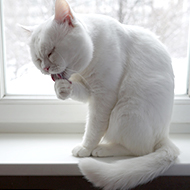
BVA warns pet owners of potential winter hazards
The British Veterinary Association (BVA) is urging pet owners to take extra precautions to ensure that their pets are protected from winter hazards, as a large number of veterinary surgeons report seeing cases of toxic ingestion caused by antifreeze.
As freezing temperatures and icy conditions are forecast in many parts of the country, cats, dogs and small animals are at a much greater risk of harm from the hidden and potentially fatal hazards that are present during this period.
In it's January 2020 Voice of the Veterinary Profession survey, the BVA found that 51 percent of veterinary professionals who treated toxic ingestion in cats over this period saw cases caused by antifreeze.
The association wants to ensure that pet owners are aware of the dangers of antifreeze and that they clean up any spills immediately and keep bottles well out of reach.
As part of it's advice, the BVA reminds dog owners to protect their pets from cold weather by providing them with coats and wiping grit or ice from their paws after a walk.
Additionally, owners of small animals are encouraged to ensure that hutches and cages are well-protected from ice, snow and rain. Providing extra bedding where necessary.
BVA senior vice president Daniella Dos Santos advised anyone concerned about their pet's health in this cold weather to seek advice from their local veterinary practice.



 The Veterinary Medicines Directorate (VMD) is inviting applications from veterinary students to attend a one-week extramural studies (EMS) placement in July 2026.
The Veterinary Medicines Directorate (VMD) is inviting applications from veterinary students to attend a one-week extramural studies (EMS) placement in July 2026.